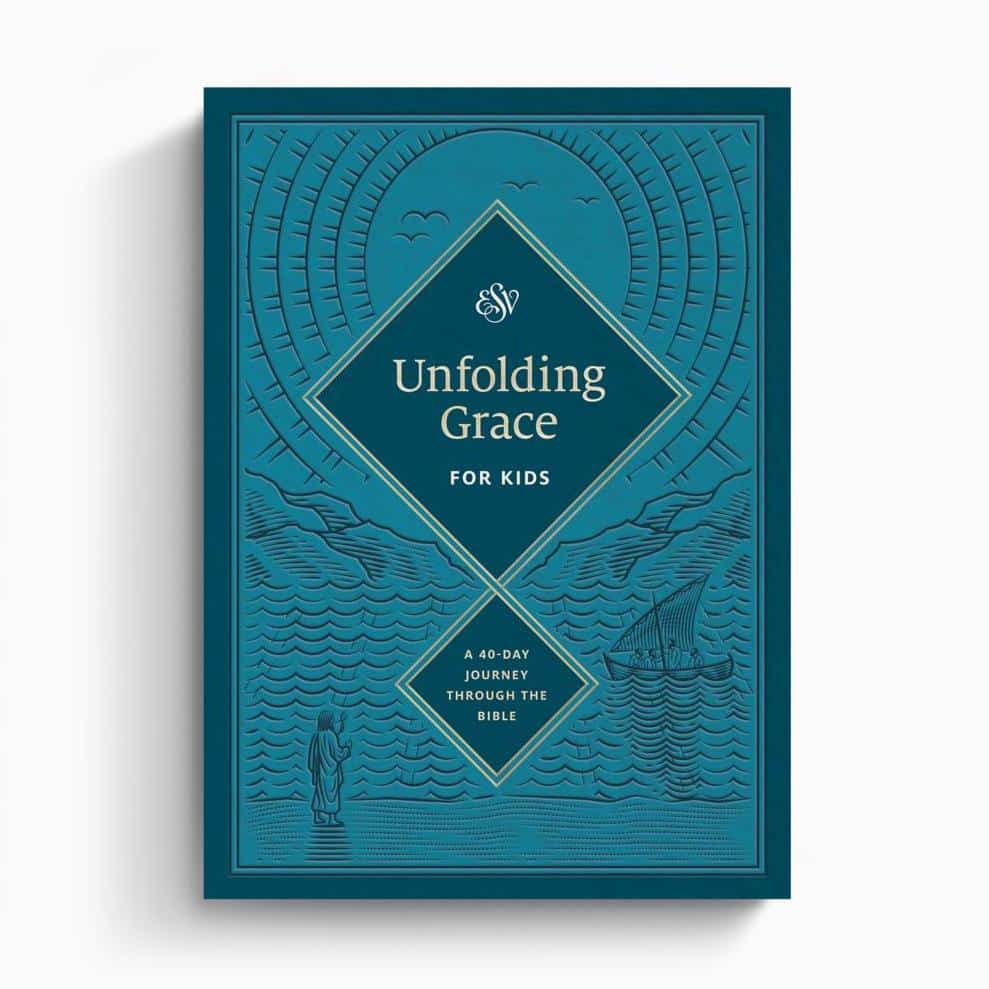LESSON SEVENTEEN
The Rejection of Saul and Anointing of David
Israel receives what they ask for: a king “to judge us like all the nations.” Saul looks tall, attractive, and wealthy. Yet, while he embodies the world’s values, he lacks fundamental inward realities, the virtues that matter to God: humility, trust, and resolute obedience. Saul’s failures teach us to long for a better king.
The prophet Samuel privately anoints David as the next and future king. Although Israel prefers Saul, God looks on the heart. And so he chooses a humble shepherd.
Nothing contrasts the value systems of God and the world like the narrative of David and Goliath. This is not about how to take on the “giants” that stand in the way of our dreams. It is about the weak versus the strong, faith versus arrogance, the living God versus lifeless idols. It is ultimately about how God rescues his helpless people through his Spirit-anointed, faith-filled, Serpent-crushing warrior-king.
God rescues his helpless people through his Spirit-anointed, faith-filled, Serpent-crushing warrior-king.
David pictures how God will ultimately rescue his people through Jesus’ death, resurrection, and soon return. The cross looks like weakness, but it is the victory of God. It looks like defeat, but sin, death, and Satan are crushed beneath the crucified and risen King.
SCRIPTURE READING
1 Samuel 15-17
Reading Time: 16 Minutes
And Samuel said to Saul, “The Lord sent me to anoint you king over his people Israel; now therefore listen to the words of the Lord. Thus says the Lord of hosts, ‘I have noted what Amalek did to Israel in opposing them on the way when they came up out of Egypt. Now go and strike Amalek and devote to destruction all that they have. Do not spare them, but kill both man and woman, child and infant, ox and sheep, camel and donkey.’ ”
So Saul summoned the people and numbered them in Telaim, two hundred thousand men on foot, and ten thousand men of Judah. And Saul came to the city of Amalek and lay in wait in the valley. Then Saul said to the Kenites, “Go, depart; go down from among the Amalekites, lest I destroy you with them. For you showed kindness to all the people of Israel when they came up out of Egypt.” So the Kenites departed from among the Amalekites. And Saul defeated the Amalekites from Havilah as far as Shur, which is east of Egypt. And he took Agag the king of the Amalekites alive and devoted to destruction all the people with the edge of the sword. But Saul and the people spared Agag and the best of the sheep and of the oxen and of the fattened calves and the lambs, and all that was good, and would not utterly destroy them. All that was despised and worthless they devoted to destruction.
The word of the Lord came to Samuel: “I regret that I have made Saul king, for he has turned back from following me and has not performed my commandments.” And Samuel was angry, and he cried to the Lord all night. And Samuel rose early to meet Saul in the morning. And it was told Samuel, “Saul came to Carmel, and behold, he set up a monument for himself and turned and passed on and went down to Gilgal.” And Samuel came to Saul, and Saul said to him, “Blessed be you to the Lord. I have performed the commandment of the Lord.” And Samuel said, “What then is this bleating of the sheep in my ears and the lowing of the oxen that I hear?” Saul said, “They have brought them from the Amalekites, for the people spared the best of the sheep and of the oxen to sacrifice to the Lord your God, and the rest we have devoted to destruction.” Then Samuel said to Saul, “Stop! I will tell you what the Lord said to me this night.” And he said to him, “Speak.”
And Samuel said, “Though you are little in your own eyes, are you not the head of the tribes of Israel? The Lord anointed you king over Israel. And the Lord sent you on a mission and said, ‘Go, devote to destruction the sinners, the Amalekites, and fight against them until they are consumed.’ Why then did you not obey the voice of the Lord? Why did you pounce on the spoil and do what was evil in the sight of the Lord?” And Saul said to Samuel, “I have obeyed the voice of the Lord. I have gone on the mission on which the Lord sent me. I have brought Agag the king of Amalek, and I have devoted the Amalekites to destruction. But the people took of the spoil, sheep and oxen, the best of the things devoted to destruction, to sacrifice to the Lord your God in Gilgal.” And Samuel said,
“Has the Lord as great delight in burnt offerings and sacrifices,
as in obeying the voice of the Lord?
Behold, to obey is better than sacrifice,
and to listen than the fat of rams.
For rebellion is as the sin of divination,
and presumption is as iniquity and idolatry.
Because you have rejected the word of the Lord,
he has also rejected you from being king.”
Saul said to Samuel, “I have sinned, for I have transgressed the commandment of the Lord and your words, because I feared the people and obeyed their voice. Now therefore, please pardon my sin and return with me that I may bow before the Lord.” And Samuel said to Saul, “I will not return with you. For you have rejected the word of the Lord, and the Lord has rejected you from being king over Israel.” As Samuel turned to go away, Saul seized the skirt of his robe, and it tore. And Samuel said to him, “The Lord has torn the kingdom of Israel from you this day and has given it to a neighbor of yours, who is better than you. And also the Glory of Israel will not lie or have regret, for he is not a man, that he should have regret.” Then he said, “I have sinned; yet honor me now before the elders of my people and before Israel, and return with me, that I may bow before the Lord your God.” So Samuel turned back after Saul, and Saul bowed before the Lord.
Then Samuel said, “Bring here to me Agag the king of the Amalekites.” And Agag came to him cheerfully. Agag said, “Surely the bitterness of death is past.” And Samuel said, “As your sword has made women childless, so shall your mother be childless among women.” And Samuel hacked Agag to pieces before the Lord in Gilgal.
Then Samuel went to Ramah, and Saul went up to his house in Gibeah of Saul. And Samuel did not see Saul again until the day of his death, but Samuel grieved over Saul. And the Lord regretted that he had made Saul king over Israel.
The Lord said to Samuel, “How long will you grieve over Saul, since I have rejected him from being king over Israel? Fill your horn with oil, and go. I will send you to Jesse the Bethlehemite, for I have provided for myself a king among his sons.” And Samuel said, “How can I go? If Saul hears it, he will kill me.” And the Lord said, “Take a heifer with you and say, ‘I have come to sacrifice to the Lord.’ And invite Jesse to the sacrifice, and I will show you what you shall do. And you shall anoint for me him whom I declare to you.” Samuel did what the Lord commanded and came to Bethlehem. The elders of the city came to meet him trembling and said, “Do you come peaceably?” And he said, “Peaceably; I have come to sacrifice to the Lord. Consecrate yourselves, and come with me to the sacrifice.” And he consecrated Jesse and his sons and invited them to the sacrifice.
When they came, he looked on Eliab and thought, “Surely the Lord’s anointed is before him.” But the Lord said to Samuel, “Do not look on his appearance or on the height of his stature, because I have rejected him. For the Lord sees not as man sees: man looks on the outward appearance, but the Lord looks on the heart.” Then Jesse called Abinadab and made him pass before Samuel. And he said, “Neither has the Lord chosen this one.” Then Jesse made Shammah pass by. And he said, “Neither has the Lord chosen this one.” And Jesse made seven of his sons pass before Samuel. And Samuel said to Jesse, “The Lord has not chosen these.” Then Samuel said to Jesse, “Are all your sons here?” And he said, “There remains yet the youngest, but behold, he is keeping the sheep.” And Samuel said to Jesse, “Send and get him, for we will not sit down till he comes here.” And he sent and brought him in. Now he was ruddy and had beautiful eyes and was handsome. And the Lord said, “Arise, anoint him, for this is he.” Then Samuel took the horn of oil and anointed him in the midst of his brothers. And the Spirit of the Lord rushed upon David from that day forward. And Samuel rose up and went to Ramah.
Now the Spirit of the Lord departed from Saul, and a harmful spirit from the Lord tormented him. And Saul’s servants said to him, “Behold now, a harmful spirit from God is tormenting you. Let our lord now command your servants who are before you to seek out a man who is skillful in playing the lyre, and when the harmful spirit from God is upon you, he will play it, and you will be well.” So Saul said to his servants, “Provide for me a man who can play well and bring him to me.” One of the young men answered, “Behold, I have seen a son of Jesse the Bethlehemite, who is skillful in playing, a man of valor, a man of war, prudent in speech, and a man of good presence, and the Lord is with him.” Therefore Saul sent messengers to Jesse and said, “Send me David your son, who is with the sheep.” And Jesse took a donkey laden with bread and a skin of wine and a young goat and sent them by David his son to Saul. And David came to Saul and entered his service. And Saul loved him greatly, and he became his armor-bearer. And Saul sent to Jesse, saying, “Let David remain in my service, for he has found favor in my sight.” And whenever the harmful spirit from God was upon Saul, David took the lyre and played it with his hand. So Saul was refreshed and was well, and the harmful spirit departed from him.
Now the Philistines gathered their armies for battle. And they were gathered at Socoh, which belongs to Judah, and encamped between Socoh and Azekah, in Ephes-dammim. And Saul and the men of Israel were gathered, and encamped in the Valley of Elah, and drew up in line of battle against the Philistines. And the Philistines stood on the mountain on the one side, and Israel stood on the mountain on the other side, with a valley between them. And there came out from the camp of the Philistines a champion named Goliath of Gath, whose height was six cubits and a span. He had a helmet of bronze on his head, and he was armed with a coat of mail, and the weight of the coat was five thousand shekels of bronze. And he had bronze armor on his legs, and a javelin of bronze slung between his shoulders. The shaft of his spear was like a weaver’s beam, and his spear’s head weighed six hundred shekels of iron. And his shield-bearer went before him. He stood and shouted to the ranks of Israel, “Why have you come out to draw up for battle? Am I not a Philistine, and are you not servants of Saul? Choose a man for yourselves, and let him come down to me. If he is able to fight with me and kill me, then we will be your servants. But if I prevail against him and kill him, then you shall be our servants and serve us.” And the Philistine said, “I defy the ranks of Israel this day. Give me a man, that we may fight together.” When Saul and all Israel heard these words of the Philistine, they were dismayed and greatly afraid.
Now David was the son of an Ephrathite of Bethlehem in Judah, named Jesse, who had eight sons. In the days of Saul the man was already old and advanced in years. The three oldest sons of Jesse had followed Saul to the battle. And the names of his three sons who went to the battle were Eliab the firstborn, and next to him Abinadab, and the third Shammah. David was the youngest. The three eldest followed Saul, but David went back and forth from Saul to feed his father’s sheep at Bethlehem. For forty days the Philistine came forward and took his stand, morning and evening.
And Jesse said to David his son, “Take for your brothers an ephah of this parched grain, and these ten loaves, and carry them quickly to the camp to your brothers. Also take these ten cheeses to the commander of their thousand. See if your brothers are well, and bring some token from them.”
Now Saul and they and all the men of Israel were in the Valley of Elah, fighting with the Philistines. And David rose early in the morning and left the sheep with a keeper and took the provisions and went, as Jesse had commanded him. And he came to the encampment as the host was going out to the battle line, shouting the war cry. And Israel and the Philistines drew up for battle, army against army. And David left the things in charge of the keeper of the baggage and ran to the ranks and went and greeted his brothers. As he talked with them, behold, the champion, the Philistine of Gath, Goliath by name, came up out of the ranks of the Philistines and spoke the same words as before. And David heard him.
All the men of Israel, when they saw the man, fled from him and were much afraid. And the men of Israel said, “Have you seen this man who has come up? Surely he has come up to defy Israel. And the king will enrich the man who kills him with great riches and will give him his daughter and make his father’s house free in Israel.” And David said to the men who stood by him, “What shall be done for the man who kills this Philistine and takes away the reproach from Israel? For who is this uncircumcised Philistine, that he should defy the armies of the living God?” And the people answered him in the same way, “So shall it be done to the man who kills him.”
Now Eliab his eldest brother heard when he spoke to the men. And Eliab’s anger was kindled against David, and he said, “Why have you come down? And with whom have you left those few sheep in the wilderness? I know your presumption and the evil of your heart, for you have come down to see the battle.” And David said, “What have I done now? Was it not but a word?” And he turned away from him toward another, and spoke in the same way, and the people answered him again as before.
When the words that David spoke were heard, they repeated them before Saul, and he sent for him. And David said to Saul, “Let no man’s heart fail because of him. Your servant will go and fight with this Philistine.” And Saul said to David, “You are not able to go against this Philistine to fight with him, for you are but a youth, and he has been a man of war from his youth.” But David said to Saul, “Your servant used to keep sheep for his father. And when there came a lion, or a bear, and took a lamb from the flock, I went after him and struck him and delivered it out of his mouth. And if he arose against me, I caught him by his beard and struck him and killed him. Your servant has struck down both lions and bears, and this uncircumcised Philistine shall be like one of them, for he has defied the armies of the living God.” And David said, “The Lord who delivered me from the paw of the lion and from the paw of the bear will deliver me from the hand of this Philistine.” And Saul said to David, “Go, and the Lord be with you!”
Then Saul clothed David with his armor. He put a helmet of bronze on his head and clothed him with a coat of mail, and David strapped his sword over his armor. And he tried in vain to go, for he had not tested them. Then David said to Saul, “I cannot go with these, for I have not tested them.” So David put them off. Then he took his staff in his hand and chose five smooth stones from the brook and put them in his shepherd’s pouch. His sling was in his hand, and he approached the Philistine.
And the Philistine moved forward and came near to David, with his shield-bearer in front of him. And when the Philistine looked and saw David, he disdained him, for he was but a youth, ruddy and handsome in appearance. And the Philistine said to David, “Am I a dog, that you come to me with sticks?” And the Philistine cursed David by his gods. The Philistine said to David, “Come to me, and I will give your flesh to the birds of the air and to the beasts of the field.” Then David said to the Philistine, “You come to me with a sword and with a spear and with a javelin, but I come to you in the name of the Lord of hosts, the God of the armies of Israel, whom you have defied. This day the Lord will deliver you into my hand, and I will strike you down and cut off your head. And I will give the dead bodies of the host of the Philistines this day to the birds of the air and to the wild beasts of the earth, that all the earth may know that there is a God in Israel, and that all this assembly may know that the Lord saves not with sword and spear. For the battle is the Lord’s, and he will give you into our hand.”
When the Philistine arose and came and drew near to meet David, David ran quickly toward the battle line to meet the Philistine. And David put his hand in his bag and took out a stone and slung it and struck the Philistine on his forehead. The stone sank into his forehead, and he fell on his face to the ground.
So David prevailed over the Philistine with a sling and with a stone, and struck the Philistine and killed him. There was no sword in the hand of David. Then David ran and stood over the Philistine and took his sword and drew it out of its sheath and killed him and cut off his head with it. When the Philistines saw that their champion was dead, they fled. And the men of Israel and Judah rose with a shout and pursued the Philistines as far as Gath and the gates of Ekron, so that the wounded Philistines fell on the way from Shaaraim as far as Gath and Ekron. And the people of Israel came back from chasing the Philistines, and they plundered their camp. And David took the head of the Philistine and brought it to Jerusalem, but he put his armor in his tent.
As soon as Saul saw David go out against the Philistine, he said to Abner, the commander of the army, “Abner, whose son is this youth?” And Abner said, “As your soul lives, O king, I do not know.” And the king said, “Inquire whose son the boy is.” And as soon as David returned from the striking down of the Philistine, Abner took him, and brought him before Saul with the head of the Philistine in his hand. And Saul said to him, “Whose son are you, young man?” And David answered, “I am the son of your servant Jesse the Bethlehemite.”
1 SAMUEL 15-17
Study Guide Questions
- What does God’s rejection of Saul teach us about how God views sin?
- What does the story of David’s anointing teach us about the character qualities that God values most? How do we see these embodied in Jesus?
- How does David’s defeat of Goliath foreshadow Jesus’ work on behalf of his people?
1 SAMUEL 17:1–54
Family Discussion Questions
- What do we learn about David’s character and trust in the Lord from this story?
- Goliath was stronger and fiercer than David. So why did David have confidence that Goliath would be defeated?
- Is this story more about David defeating Goliath or God defeating Goliath? Why do you think that?
- By this point in the Bible, we’re expecting a kingly descendant of Eve to come through Abraham’s line to crush the head of the ancient serpent, Satan. What connections between that promise and this story do you see?
- How does this story point forward to the greater victory of Jesus over Satan through his life, death, resurrection, or future return?
PART THREE REVIEW
God’s Kingdom Established
God brings the people of Israel into the land of Canaan through Joshua’s leadership. In doing so, he continues to fulfill his promises to Abraham: he multiplies Abraham’s offspring and gives them this good land to inhabit. But Israel rejects God and slides into a spiritual, moral, political, and social decline. In response, God graciously brings order to the nation by giving Saul as its first king. But when Saul proves to be prideful and unfaithful to the Lord, God gives his people David, a flawed but humble king.
God promises David that his line will never end—his lineage will lead to an eternal kingdom. God will channel the blessings of Abraham through the line of David (ultimately leading to Jesus). David’s son Solomon builds a temple for God’s presence and brings Israel into its greatest time of material blessing.
LESSON SEVENTEEN
The Rejection of Saul and Anointing of David
Israel’s first king was Saul. He was tall, handsome, and wealthy. But he did not have what matters most to God: humility. He did not trust God, nor was he committed to obeying God. Because Saul failed, the prophet Samuel showed that David would be Israel’s next king.
This next account shows us the difference between what the world values and what God values. This battle between David and Goliath does not teach us how we can face giants like David did. Instead, this text shows us how God rescues his helpless people through his humble, faith-filled king. In the beginning of the Bible’s story we read of a conflict between the offspring of Eve and the offspring of Satan. Here we see this conflict played out, as God’s chosen king conquers the Serpent-like giant.
David pictures how God would ultimately rescue his people through Jesus. The cross where Jesus died looks like weakness, but it was how God accomplished his victory. It looked like Jesus was weak, but he defeated sin, death, and Satan for us. As we see David defeat Goliath, we are reminded of how Jesus has rescued us.
SCRIPTURE READING
1 Samuel 17:1-54
Reading Time: 8 Minutes
Now the Philistines gathered their armies for battle. And they were gathered at Socoh, which belongs to Judah, and encamped between Socoh and Azekah, in Ephes-dammim. And Saul and the men of Israel were gathered, and encamped in the Valley of Elah, and drew up in line of battle against the Philistines. And the Philistines stood on the mountain on the one side, and Israel stood on the mountain on the other side, with a valley between them. And there came out from the camp of the Philistines a champion named Goliath of Gath, whose height was six cubits and a span. He had a helmet of bronze on his head, and he was armed with a coat of mail, and the weight of the coat was five thousand shekels of bronze. And he had bronze armor on his legs, and a javelin of bronze slung between his shoulders. The shaft of his spear was like a weaver’s beam, and his spear’s head weighed six hundred shekels of iron. And his shield-bearer went before him. He stood and shouted to the ranks of Israel, “Why have you come out to draw up for battle? Am I not a Philistine, and are you not servants of Saul? Choose a man for yourselves, and let him come down to me. If he is able to fight with me and kill me, then we will be your servants. But if I prevail against him and kill him, then you shall be our servants and serve us.” And the Philistine said, “I defy the ranks of Israel this day. Give me a man, that we may fight together.” When Saul and all Israel heard these words of the Philistine, they were dismayed and greatly afraid.
Now David was the son of an Ephrathite of Bethlehem in Judah, named Jesse, who had eight sons. In the days of Saul the man was already old and advanced in years. The three oldest sons of Jesse had followed Saul to the battle. And the names of his three sons who went to the battle were Eliab the firstborn, and next to him Abinadab, and the third Shammah. David was the youngest. The three eldest followed Saul, but David went back and forth from Saul to feed his father’s sheep at Bethlehem. For forty days the Philistine came forward and took his stand, morning and evening.
And Jesse said to David his son, “Take for your brothers an ephah of this parched grain, and these ten loaves, and carry them quickly to the camp to your brothers. Also take these ten cheeses to the commander of their thousand. See if your brothers are well, and bring some token from them.”
Now Saul and they and all the men of Israel were in the Valley of Elah, fighting with the Philistines. And David rose early in the morning and left the sheep with a keeper and took the provisions and went, as Jesse had commanded him. And he came to the encampment as the host was going out to the battle line, shouting the war cry. And Israel and the Philistines drew up for battle, army against army. And David left the things in charge of the keeper of the baggage and ran to the ranks and went and greeted his brothers. As he talked with them, behold, the champion, the Philistine of Gath, Goliath by name, came up out of the ranks of the Philistines and spoke the same words as before. And David heard him.
All the men of Israel, when they saw the man, fled from him and were much afraid. And the men of Israel said, “Have you seen this man who has come up? Surely he has come up to defy Israel. And the king will enrich the man who kills him with great riches and will give him his daughter and make his father’s house free in Israel.” And David said to the men who stood by him, “What shall be done for the man who kills this Philistine and takes away the reproach from Israel? For who is this uncircumcised Philistine, that he should defy the armies of the living God?” And the people answered him in the same way, “So shall it be done to the man who kills him.”
Now Eliab his eldest brother heard when he spoke to the men. And Eliab’s anger was kindled against David, and he said, “Why have you come down? And with whom have you left those few sheep in the wilderness? I know your presumption and the evil of your heart, for you have come down to see the battle.” And David said, “What have I done now? Was it not but a word?” And he turned away from him toward another, and spoke in the same way, and the people answered him again as before.
When the words that David spoke were heard, they repeated them before Saul, and he sent for him. And David said to Saul, “Let no man’s heart fail because of him. Your servant will go and fight with this Philistine.” And Saul said to David, “You are not able to go against this Philistine to fight with him, for you are but a youth, and he has been a man of war from his youth.” But David said to Saul, “Your servant used to keep sheep for his father. And when there came a lion, or a bear, and took a lamb from the flock, I went after him and struck him and delivered it out of his mouth. And if he arose against me, I caught him by his beard and struck him and killed him. Your servant has struck down both lions and bears, and this uncircumcised Philistine shall be like one of them, for he has defied the armies of the living God.” And David said, “The Lord who delivered me from the paw of the lion and from the paw of the bear will deliver me from the hand of this Philistine.” And Saul said to David, “Go, and the Lord be with you!”
Then Saul clothed David with his armor. He put a helmet of bronze on his head and clothed him with a coat of mail, and David strapped his sword over his armor. And he tried in vain to go, for he had not tested them. Then David said to Saul, “I cannot go with these, for I have not tested them.” So David put them off. Then he took his staff in his hand and chose five smooth stones from the brook and put them in his shepherd’s pouch. His sling was in his hand, and he approached the Philistine.
And the Philistine moved forward and came near to David, with his shield-bearer in front of him. And when the Philistine looked and saw David, he disdained him, for he was but a youth, ruddy and handsome in appearance. And the Philistine said to David, “Am I a dog, that you come to me with sticks?” And the Philistine cursed David by his gods. The Philistine said to David, “Come to me, and I will give your flesh to the birds of the air and to the beasts of the field.” Then David said to the Philistine, “You come to me with a sword and with a spear and with a javelin, but I come to you in the name of the Lord of hosts, the God of the armies of Israel, whom you have defied. This day the Lord will deliver you into my hand, and I will strike you down and cut off your head. And I will give the dead bodies of the host of the Philistines this day to the birds of the air and to the wild beasts of the earth, that all the earth may know that there is a God in Israel, and that all this assembly may know that the Lord saves not with sword and spear. For the battle is the Lord’s, and he will give you into our hand.”
When the Philistine arose and came and drew near to meet David, David ran quickly toward the battle line to meet the Philistine. And David put his hand in his bag and took out a stone and slung it and struck the Philistine on his forehead. The stone sank into his forehead, and he fell on his face to the ground.
So David prevailed over the Philistine with a sling and with a stone, and struck the Philistine and killed him. There was no sword in the hand of David. Then David ran and stood over the Philistine and took his sword and drew it out of its sheath and killed him and cut off his head with it. When the Philistines saw that their champion was dead, they fled. And the men of Israel and Judah rose with a shout and pursued the Philistines as far as Gath and the gates of Ekron, so that the wounded Philistines fell on the way from Shaaraim as far as Gath and Ekron. And the people of Israel came back from chasing the Philistines, and they plundered their camp. And David took the head of the Philistine and brought it to Jerusalem, but he put his armor in his tent.
SERMON SERIES
Finding Our Purpose in God’s Plan
These six messages belong to the Unfolding Grace: Finding Our Purpose in God’s Plan sermon series that author and pastor Drew Hunter preached at his home church. Through these six messages, he tells us the story of the Bible—a story that reveals the grace of God.
BUY THE BOOK
Book Series
The content you enjoy in this Unfolding Grace Reading Plan comes from the Unfolding Grace book series by Pastor Drew Hunter, published by Crossway Publishers. We encourage you to purchase a physical copy of Unfolding Grace to use individually, with your family, or as a small group.








